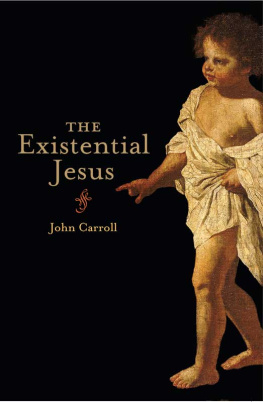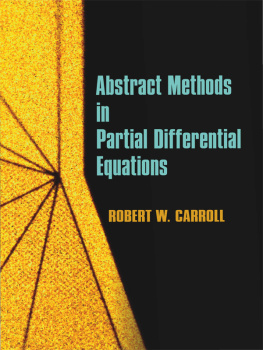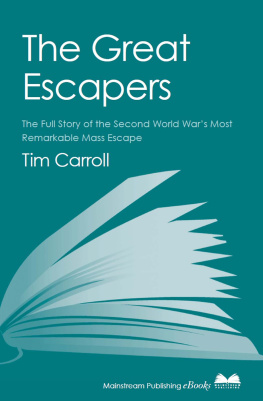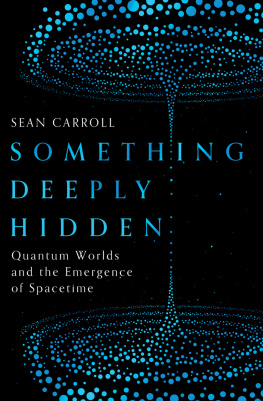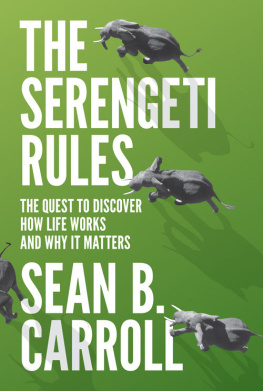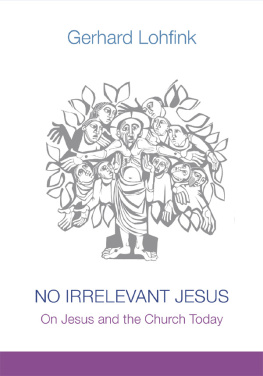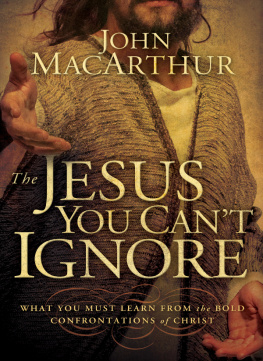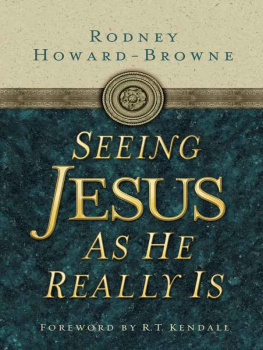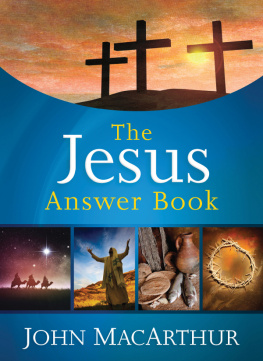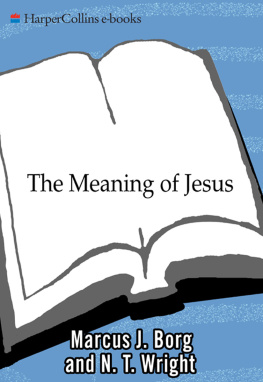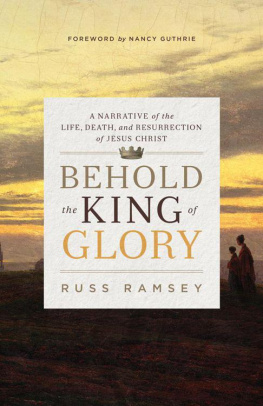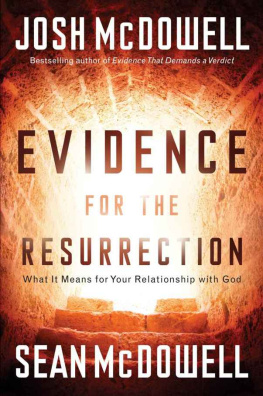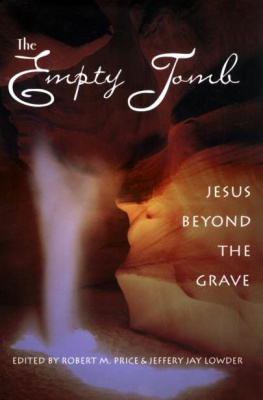
Scribe Publications
THE EXISTENTIAL JESUS
John Carroll is professor of sociology at La Trobe University in Melbourne. His recent books include The Wreck of Western Culture: humanism revisited , The Existential Jesus , a new version of Ego and Soul , and Greek Pilgrimage .
Scribe Publications Pty Ltd
1820 Edward St, Brunswick, Victoria, Australia 3056
Email: info@scribepub.com.au
First published by Scribe 2007
This edition published 2011
Copyright John Carroll 2007
All rights reserved. Without limiting the rights under copyright reserved above, no part of this publication may be reproduced, stored in or introduced into a retrieval system, or transmitted, in any form or by any means (electronic, mechanical, photocopying, recording or otherwise) without the prior written permission of the publishers of this book.
National Library of Australia
Cataloguing-in-Publication data
Carroll, John, 1944-
The Existential Jesus.
New ed.
9781921753893 (e-book.)
Includes bibliographical references.
1. Jesus ChristPhilosophy. 2. Christianity and existentialism.
www.scribepublications.com.au
Contents
PART I: THE STORY
PART II: THEY WHO FOLLOW
THE ENIGMA OF BEING
The enigma of being confronts all humans. It does so whenever another walks in the door. We take in a presence: the person opposite is more than his or her attributes. Stripping away the colour of the hair, the age of the face, and whatever we know about the life story, there remains this ethereal concentration of being. In the place of empty space, a charged field of some kind of force manifests itself. It is a field with its own phantasmal shape. It lives more as a distillation or essence than as a character or personality. Behind each of these existential forms lies the big presence in the culture of the West that of Jesus.
Jesus is the archetypal stranger. He appears from nowhere, shrouded in mystery, but soon is gone. While others see him charged with brilliant and terrifying charisma, he himself struggles along his life-path. He is the existential hero solitary, uprooted from family and home, restless, always on the move and, until the mid-point in his mission, blind to where he is going. He has no occupation, nor worldly power. He chooses followers, tries to teach them, but they remain foolishly obtuse. Everything he attempts founders. Increasingly feared and misunderstood by those closest to him, increasingly hated by the authorities, he withdraws into troubled introspection. The people rise in outrage against him.
This is the Jesus portrayed in the earliest recording of his life, the first Gospel, that of Mark. By the end of the story, he has lost confidence in any God up above. He himself is all there is he alone. The climax to his life is six hours of torture nailed to a cross. It ends in a colossal scream, as he breathes his last. There is no resurrection from the dead. The story closes inside an empty tomb, with three women fleeing, out of their minds with fear.
Marks story is an enigma . This English word was taken over directly from the Greek ainigma . Aeschylus used it in the most profound of all classical Greek tragedies, Agamemnon , to mean dark saying, or grimly prophetic riddle. Marks story is one long and complete dark saying .
Why is he the existential Jesus? Because the normal identifying markers of the self have been stripped away from him family, friends, a past, an occupation, and even an anticipated life-path. In effect, all he can proclaim about himself is: I exist. His story then becomes a quest for the I that exists. What is the nature of his being? What powers may he draw upon? How should he live in relation to the one thing that he has been given: his own existence?
What is truth? Pilate will ask Jesus. That is indeed the question. Of course, there are material facts. And there are moral truths. But these are the lower and middle orders. The question is about higher order, or capital T truth. If Truth exists, what is its substance? Which is its domain? Or is it an illusion?
We are haunted by the Truth that we suspect lies behind things. On the surface, events and their emotional currents fill the mind. These are the things that happen between birth and death people encountered, children raised, jobs performed, homes built, schedules and pastimes, achievements and failures, loves and griefs. A myriad of such threads weave the cloth of an individual life.
Yet somehow the subterranean truth is everything. It is like a mysterious stranger encountered on an afternoon walk, an intrusive and unwelcome companion who is fleetingly there, then gone. Only afterwards, in reflection, one comes to fear that this was the vital encounter, and it may have been missed.
The imagination is full with its promise that it might tap into the source of vital energy, injecting the zest and dynamism that is lacking; that it might bring illumination to a life, and provide the key to what it is all about, bestowing meaning. Conversely, without such a truth, or truths, life sinks into routine lacklustre in mood, absurd in content, ultimately futile. Without these truths, we might be on the wrong train, at the wrong time, going in the wrong direction. So we fear, but are not sure. The truths are our signposts.
So we explore ancient sites seeking some timeless authority a blurred inscription in stone, a sculpted face, a special place with sacred presence. So we plunge into romance, dreaming that the other might be the one. So we form families in the hope of redemptive cosiness, and steadfast belonging, or a new generation that will rise higher. So we search for a central life-activity a vocation for work that is more than a profane job. So we build nations, cities, and institutions, imagining that if we get the form right, then what we have made will be more than bricks and mortar; a sort of perfection that will endure. In a modest way we have similar dreams about a memo; an essay; a well-decorated, clean, or orderly room; and, especially, a performance at sport.
When reality strikes back, as it inevitably does, much of this turns out to have been an illusion. Its an illusion that at best redeemed life for a while, before popping like a soap bubble. However, if redemptive illusion is all there is, the truth about human life, the whole truth if we are honest is that it swings between the absurd and the horrible. There is nothing more. Here is the starting point for the Jesus Story.
The modern Wests most influential literary work, Hamlet , orbits around the question, To be or not to be? Truth, it implies, is to do with the nature of being. And many today do seek a richer conception of the self the site where it is imagined that important truth dwells. Hence the wide appeal of Eastern philosophy, with its greater emphasis on inner consciousness. Hence the prevalence of theories and therapies that promise the self more understanding of its own nature.
European philosophy itself, in the twentieth century, swung back to focus on being . This was a return to the beginning. At the historical start of Western culture, in classical Greece, the inscription carved in stone over the entrance to the sacred oracle, in Delphi, commanded: Know thyself! The essence of each individual living human the I holds the secret . What each person really wants to know dwells here : Who am I?
The West has one supreme teacher on being . Only one has fathomed its depths. Through the grand course of Western culture, from Homer to us, most is to be learnt about the I from Jesus. His own way of putting it was, I am . This teaching is not abstract like philosophy. The philosopher, at most, supplies a body of dictums that may be pondered sagely in the mind, but fail to engage viscerally with the fundament of the self.
Next page
